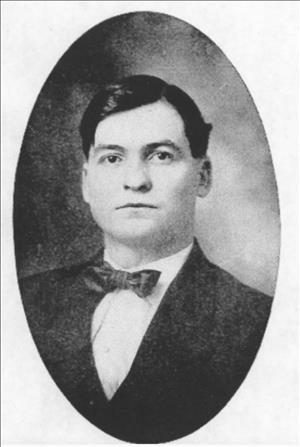John E. Campbell of Everett served as a member of the Washington State House of Representatives in the 1909 and 1911 sessions. He was elected to the state Senate in 1912, representing the 38th District, and served as state senator from 1913 to 1915. As a young man he worked as a logger. He began his political career as a progressive Republican, and by 1910 had declared himself a political Progressive. A strong supporter of labor issues, he bought an interest in the Labor Journal, and served as its business manager from 1905 to 1911, in partnership with editor Ernest Marsh. Campbell authored the Washington women’s eight-hour work day bill in 1911 and a bill providing for a female Deputy Labor Commissioner, as well as various railroad workers’ and workman’s compensation bills. After he left politics he returned to journalism to manage the Port Angeles Herald from 1917 to the early 1920s and then worked for the Washington State Department of Fisheries. At the time of his death at the young age of 43, Campbell was deputy in Everett for the State Department of Labor and Industries. He died of spinal meningitis in 1924 and is buried at Everett’s Evergreen Cemetery.
From Lumber Camp to Politics
The early 1900s was a time of political turmoil in the Pacific Northwest, and Western states contributed significantly to the rise of Progressivism. Washington state’s Republican dominance began to change as the party split over issues and candidates. Increasingly irritated with the power that East Coast investors -- particularly the railroads -- held over their economic fate, West Coast states bargained for regional control. Populism and reform gained significant strength in the West, and many followed Theodore Roosevelt as a reform champion who advocated conservation programs as well as government control over big-money trusts. Washington state Republicans split between support of Roosevelt and Taft and Roosevelt Republicans began calling themselves Progressives. John E. Campbell of Everett was one of those political Progressives who served at a time when there was significant support in Olympia for workers’ rights.
Born in 1880 in Burnside, Michigan, Campbell came to Everett with his family in 1902, at age 22, and began working in various lumber camps and shingle mills. In 1905, he purchased an interest in the Labor Journal, published in Everett, and became its business manager, a position he held until 1912. At the time, Ernest Marsh was the newspaper’s editor. Marsh was a prominent and eloquent voice in support of labor during the period of the Everett Massacre, the November 5, 1916, confrontation on the waterfront between members of the Industrial Workers of the World and a vigilante posse in which seven people died.
A Voice for Labor
In 1908 Campbell entered politics, running for a state House seat as a progressive Republican, but he won his second House term and a State Senate position (1911-1915) as a Progressive. This was typical of other state Progressives who supported reform politics in the state. Campbell was a strong voice for labor, going on record in support of every bill presented that gave protection to Washington’s laboring men and women. In the 1909 session Campbell introduced and passed two bills for railroad workers, the “Electric Headlight Law” and the “Standard Caboose Law,” the latter setting legal standards for the size of caboose living quarters.
Working with Alice Lord (1877-1940) of Seattle, Campbell introduced a bill in 1908 to limit women’s work hours to eight a day, but industry lobbyists defeated the bill in that year. Following the 1910 passage of women’s suffrage, Campbell and Lord had a strong contingency in 1911 to back H. B. 12, the women’s 8-hour work day. This time it passed, with exclusion of fisheries and canneries.
Campbell ran for the state Senate in 1912, and claimed authorship of the eight-hour law for women, the bill providing for female Deputy Labor Commission, support of various railroad workers’ bills, support for women’s compensation bills, and all workman’s compensation legislation. He had many supporters and endorsements from the Farmers’ Union, Farmers’ Grange, Direct Legislation League, and the Federation of Labor. Campbell won the Senate seat and served from 1913 to 1915.
Life After Politics
Campbell was nominated in Snohomish County for the United States congress but although he carried the county, he was defeated in his district. He returned to journalism and he very briefly served as business manager for the Port Angeles Herald. This venture seems to have been more political than journalistic, an arrangement to weaken a rival paper. That quickly effected, Campbell moved on. From 1917 to 1921, he worked for the State Department of Fisheries, and from 1921 to 1924 served as deputy in Everett for the State Department of Labor and Industries.
John E. Campbell’s life and career were brief. He contracted spinal meningitis at the age of 43, and died on June 14, 1924, in Everett's Providence Hospital. He was buried next to his mother in Evergreen Cemetery. Funeral Services were held at the Everett Elks’ Home. Campbell left a wife, Phoebe Collar Campbell, two brothers and a sister, and a significant legacy of accomplishments. John E. Campbell served in one of Washington state’s most productive legislative sessions and was an effective reformer for the Progressive cause.

